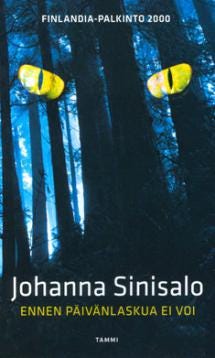I recently read a book by Finnish author Johanna Sinisalo, Herbert Lomas (Translator) called, “Troll: A Love Story.” The original interest in this book was to identify an interesting story based on local folklore in order to plan a tour of Finland.
About The Book
From Amazon:
This internationally acclaimed winner of the Finlandia Award is “a brilliant and dark parable about the fluid boundaries between human and animal” (The Boston Globe).
Angel, a young photographer, comes home from a night of carousing to find a group of drunken teenagers in the courtyard of his apartment building, taunting a wounded, helpless young troll. He takes it in, not suspecting the dramatic consequences of this decision. What does one do with a troll in the city? As the troll’s presence influences Angel’s life in ways he could never have predicted, it becomes clear that the creature is the familiar of man’s most forbidden feelings. A novel of sparkling originality, Troll is a wry, beguiling story of nature and man’s relationship to wild things, and of the dark power of the wildness in ourselves.
“[An] imaginative and engaging novel of urban fantasy . . . The stuff of ancient legend shadows with rather unnerving precision the course of unloosed postmodern desire.” —Chris Lehmann, The Washington Post Book World.
Author
Johanna Sinisalo is a native Finlandian known for her Science Fiction and Fantasy novels. “Troll: A Love Story” was her first book. She is deeply interested in human biology research and looking at the human condition from a biologically natural level. In other words, she looks at humans the same way as she does animals and her characters are treated in a manner that represents their true nature, drive, and instincts. She believes that natural scientific research doesn’t go far enough to compare the human species to those of other animals. Only in recent years has science begun to acknowledge that our genetic makeup does impact our individual behaviors. She feels that the view of humanity as some kind of higher being is sorely lacking credulity.
We are hierarchical herd animals and in everything we do, hierarchy is emphasized. We have to have different values and we are very prone to copy and imitate each other. These are purely biological drives and actually the basis of our entire society. However, people don't stop to think about this and instead imagine that all the decisions we make take place in some higher brain area, thoughtfully and rationally. - Sinisalo, YLE
You can also listen to her during the Bay Area Book Festival when she presented with fellow authors Jewelle Gomez, Ayize Jama-Everett, Carter Scholz, and moderator Charlie Jane Anderson on the topic of Subversive Speculative Fiction in 2016.
Inspiration for the Story
The title “Troll: A Love Story” is the US version. The original Finnish title is “Ennen päivänlaskua ei voi,” which translates to “not before sundown.” Below is the cover of the original. As you can see, it is a more ominous cover and aligns with much of what Johanna’s books often represent, a kind of horror theme. Yet, the title actually came from a very well known folk-song in Finland.
The story originated from a tale told in the song “Päivänsäde ja Menninkäinen” by Tapio Rautavaara. The song is about a troll that discovers a fairy by accident and falls in love with her. The only problem was that one lived by day and the other lived by night. They could never be together.
The lyrics to the song are as follows:
Päivänsäde ja menninkäinen
by Tapio Rautavaara
Aurinko kun päätti retken Siskoistaan jäi jälkeen hetken Päivänsäde viimeinen. Hämärä jo maille hiipi, Päivänsäde, kultasiipi, Aikoi juuri lentää eestä sen. Kun menninkäisen pienen näki vastaan tulevan, Se juuri oli noussut luolastaan. Kas, menninkäinen ennen päivänlaskua ei voi Milloinkaan elää päällä maan. Katselivat toisiansa; Menninkäinen rinnassansa Tunsi kummaa leiskuntaa. Sanoi "Poltat silmiäni, Mut en ole eläissäni Nähnyt mitään yhtä ihanaa! Ei haittaa vaikka loisteesi mun sokeaksi saa - On pimeässä helppo taivaltaa. Jää luokseni, niin kotiluolaan Näytän sulle tien Ja sinut armaakseni vien!" Säde vastas "Peikko kulta, Pimeys vie hengen multa, Enkä toivo kuolemaa. Pois mun täytyy heti mennä, Ellen kohta valoon lennä, Niin en hetkeäkään elää saa." Niin lähti kaunis päivänsäde, Mutta vieläkin, Kun menninkäinen yksin tallustaa, Hän miettii, miksi toinen täällä valon lapsi on Ja toinen yötä rakastaa.
Translation:
Päivänsade and the Sunbeam
When he finished the trip, left his sisters behind for a while. Päivänsade was the last. Twilight already crept to land, Daylight, golden wing, Was just about to fly in front of it. When he saw the little old man coming towards him, He had just come out of his cave. Look, the fennel before sunset can never live on the ground. They looked at each other; Menninkäinen in his chest Felt a strange crowd. Said "You're burning my eyes, But I've never seen anything so wonderful in my life! It doesn't matter if your brilliance blinds me - It's easy to fly in the dark. Stay with me, and I'll show you the way to my home cave And I'll take you as a mercy!" Sade answered "Holy goblin, Darkness takes the soul away, And I don't wish for death. I must go away immediately, Unless I fly to the light soon, Then I can't live for a moment." So the beautiful ray of day left, But even now, When the gorse tramples alone, He wonders why one is here a child of light And the other loves the night.
My Thoughts
I read this book in one weekend. It was engaging. The characters were interesting. There were many layers of backstories for each character that only added more depth and humanity to the overarching story of the main character and his troll. The layers of love triangles only added more complexity and demonstrated how the way one is perceived truly depends upon the eye of the beholder. In the end, the troll becomes the primary focus of the main character. He eschews all human logic in the defense of what he perceives as a helpless wild animal. In some context, it could also be his own way of perceiving his own experience in life. So many are interested in pursuing him, but he always finds himself kept from his own desires. The fact that a troll could magically replace all that was important to him could also represent the way in which a narcissistic abusive relationship develops. They become the center of the world and you will do anything possible to protect them even if they harm others and destroy your life. In the end, the man literally walked away from his entire existence to live with the troll’s family in the woods. Not the ending I would have predicted. It’s a good read. I would recommend taking a ride with this unique tale.







